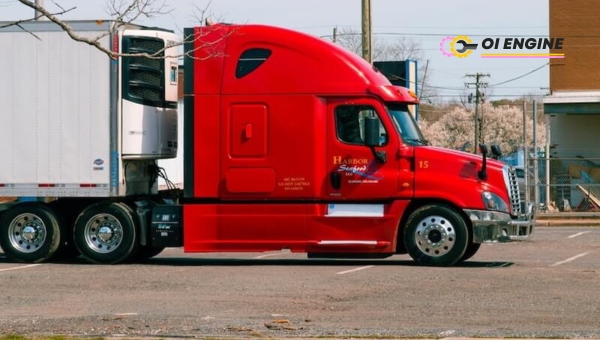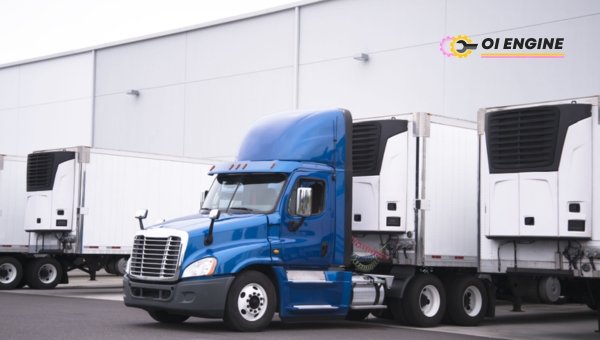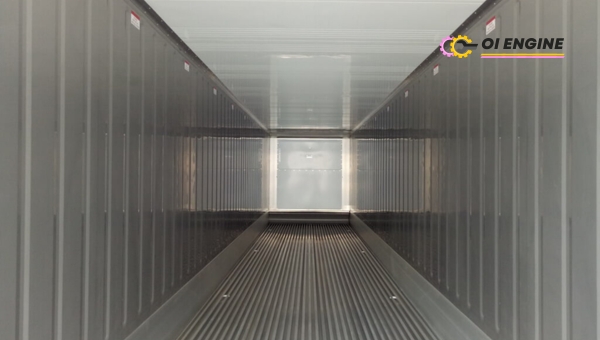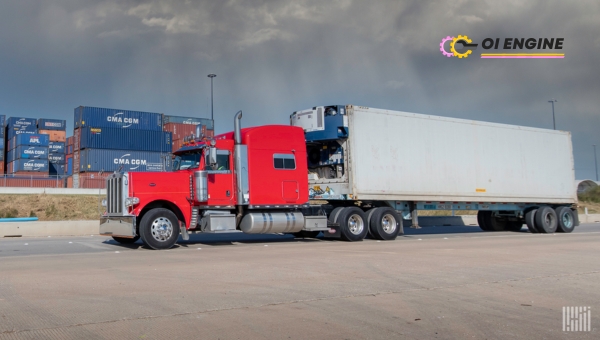Curious about what reefer trucking is and how it silently plays a pivotal role in our everyday lives? So, you have landed on the right page!
Allow me to take you on a fascinating journey of understanding reefer trucking. This is your opportunity to explore an indispensable yet often unnoticed segment of our global supply chain. Reefer trucking, in simple terms, refers to refrigerated transportation.
These specially designed trucks maintain controlled temperatures, making them perfect for moving perishable items like food or sensitive pharmaceutical products across regions. They are superheroes that transport our fresh groceries, medicines, and more!
What is Reefer Trucking?
Reefer trucking is an industry term for refrigerated transportation. Think about it this way: when you go to your local grocery store, you find fresh fruits and vegetables, dairy products, and meats in the refrigerated section.

Ever wondered how these goods remain fresh even while being transported over long distances? This is where reefer trucking comes into play.
A “reefer” is essentially a refrigerator on wheels that provides temperature-controlled cargo spaces needed for transporting perishable items such as fruits, vegetables, dairy products, or pharmaceuticals.
The trucks are specially designed with heavy-duty cooling systems to keep goods at precise temperatures throughout the journey.
So whether it’s frozen food or sensitive medical supplies – reefer trucks ensure these items reach their destination in optimal condition.
Why Refrigerated Trucks Are Called Reefers?
The phrase ‘reefer’ might seem random if one doesn’t know its historical context. When we look back at the transportation history of perishable goods, we can pinpoint the origin of this term; it’s all tied back to ships!
In maritime terms, a ‘reef’ implies reducing or making something smaller when dealing with sails on old sailing vessels.
Features such as foldability which shortened sail lengths were analogous to how these specialized transport vessels reduced spoilage rates by keeping products cold and thus came to be known as ‘reefers’.
Eventually, when technology advanced allowing for road-based transportation capable of similar feats i.e., preserving freshness using refrigeration – they too adopted this vintage term: hence refrigerated trucks are called reefers.
Also Read: How To Start A Trucking Company: A Guide
The Advantages and Disadvantages of Reefer Trucking
When pondering the question – what is reefer trucking, it’s essential to understand both the advantages and drawbacks it holds.
Reefer trucking is a double-edged sword with its undeniable benefits to food industries, pharmaceuticals, cosmetics, and more, but also presents some challenges that might make things difficult. This section will help you weigh these pros and cons.
Pros of Reefer Trucking
Reefer trucking offers many perks that drive people towards this field. To start with:
- Year-Round Demand: The demand for refrigerated goods doesn’t get affected by the changing seasons. From perishable food items to medicines, there are always items that need transporting under controlled temperatures.
- Flexible Loads: One of the big perks here is the flexibility it provides in transporting diverse goods, not just limited to food products.
- Lower Competition: Since this kind of transport requires specialized equipment and understanding, fewer players get into this market segment leading to less competition.
- Higher Rewards As you may guess due to being a niche offering with special requirements, reefer trucking jobs often pay more than standard dry van loads.
- Extensive Route Availability: Since reefer trucks deliver products vital for various industries around the nation – routes are available from dense urban areas to remote locations across country lines.
Despite these obvious incentives though, there are still obstacles one must encounter on their journey in this field.
Cons of Reefer Trucking
While lots of positives make reefer trucking enticing,- like any business has its downsides that can’t be overlooked either:
- Higher Operating Costs: Refrigerated units or reefers require extra fuel besides higher maintenance costs – making operating them more expensive than traditional trailers.
- Load Handling Takes Longer: Loading/Unloading is time-consuming because temperature checks are essential for every product that comes in or goes out of the reefer.
- Strict Delivery Windows: Due to the perishable nature of commodities, delay tolerance is quite minimal. Missed or late deliveries can result in loss of goods and heavy fines.
- Possible High-Level Stress: In maintaining complex machinery and keeping up with deadlines, some stress comes part and parcel with this kind of trucking job.
- Increased Liability: If a reefer unit failure ever occurs – it can lead to spoilage of an entire load, costing you a pretty penny in damages.
With true knowledge now on what is reefer trucking along with its perks and pitfalls – hopefully, you are better equipped to decide if this field is something you’d want to delve into. Whether we realize it or not, the world heavily relies on these ice-cold hauling heroes for their everyday needs!
Also Read: Trailer Interchange Coverage-Protect Your Fleet!
The Essential Role of Reefer Trucking
I feel that we definitely take certain things for granted day in and day out. Something as simple as our food reaching us in the freshest state possible is indeed a blessing, but there’s a whole hardworking system behind it assuring this.

That’s where reefer trucking plays a major role, it’s something so integral to our lives yet so unacknowledged by many!
Why is Reefer Trucking Needed?
Do you wonder how your favorite locally unavailable fruits manage to turn up fresh at your supermarket? Or how do life-saving medicines maintain their quality while traveling long distances?
All thanks to reefer trucks! People like me have always been curious about stuff like this, and I am excited to share what I found with you:
- Preserving Perishable Goods: The biggest advantage of reefer trucks is that they help preserve goods that can easily perish if not stored at appropriate temperatures. Such goods include fruit, vegetables, meat products, and dairy products.
- Pharmaceutical Uses: Another important role of these refrigerated vehicles comes into play in the pharmaceutical sector. Medicines, medical equipment, and other such supplies often need specific environments to maintain their effectiveness.
- Versatility: What surprised me is that reefer trucks are also used for transporting non-food items! Things like artwork or antique furniture may also require controlled environments while transportation.
This makes me realize – that when we say “What is Reefer Trucking”, we are looking at an unseen hero balancing out different sectors of our society!
Must-knows about a Reefer Load
Now what exactly does ‘Reefer Load’ mean? Here are some points people should be aware of:
- Nature Of Goods: A ‘reefer load’ refers specifically to the nature of goods being transported in the referred truck – these would normally be perishable and need controlled environments.
- Temperature Control: Based on what commodity is being shipped, reefer truckers set their temperature controls accordingly. This could range from below-freezing to a cool room temperature.
- Always Monitored: It made me realize the value of my fresh supermarket goods when I found out that these trucks are monitored 24/7 to ensure the right temperatures.
Honestly, all this expands my understanding of “What is Reefer Trucking” even further. Next time I get hold of a fresh steak or chilled milk, I will remember how much goes into keeping them that way!
Is There Profit Within the Ice-Cold Walls?
Many of you might question if there can be profit in a business cooled to sub-zero temperatures. The answer to that isn’t so chilling.

Reefer trucking, despite its demanding nature, tends to be a profitable venture.
Is Refrigerated Trucking Profitable?
When I first dived into the world of reefer trucking, a big question loomed in my mind: “Is it profitable?” After all, the trucks are expensive, and maintaining them also sips funds. Yet here’s what I found:
- Higher Pay Rates: Necessity yields benefits. The need for temperature-controlled transport means reefer services command higher pay rates than regular freight transport.
- Less Competition: Reefer trucking demands are high for specific goods like food products or pharma goods; however, not many transportation companies offer this service due to higher operating costs and stringent regulations.
- Year-Round Demand: Seasons change but the job doesn’t stop for a reefer trucky! Whether it is hot summer days or cold winter nights, there’s always cargo that needs the chilled embrace of reefers – and people willing to pay well for it!
- Diverse Job Opportunities: As many industries require refrigerated transport – from agriculture and pharmaceuticals to catering – diverse contractual opportunities arise allowing one to gain a steady income.
- Tipping Fees for Disposal: Sometimes when delivering fresh produce (like fruits or vegetables), there will be waste generated that needs proper disposal. This often incurs handling fees which increase revenue marginally.
Profit doesn’t rain down upon entering this business! It comes after efficient management of its inherent challenges such as high maintenance cost and adherence to strict controls on temperature regulation & timely delivery ensuring cargo protection from spoiling.
But amidst these ice-cold walls of adversity lies warmth sprinkled with profitability. It is the assurance of knowing that every chilled delivery makes someone’s day a little brighter, and every successful job adds up in an ever-growing financial pot.
Also Read: Trailer Interchange Coverage-Protect Your Fleet!
Details on Trucks
When I look at the wide array of vehicles on the road, it’s important to know which trucks are said to be “reefers.”
To classify a truck as a reefer, several major factors come into play. It’s mostly about what the truck features and its uses rather than its physical appearance.
What Kind of Trucks are considered Reefers?
First and foremost, you’d need to understand that not every large vehicle you see on highways is a reefer truck.
Just as there are sports cars and sedans in automobiles, trucks also have different types based on their use. So what makes certain kinds of trucks unique enough to be referred to as reefers?
Reefers or refrigerated trucks are primarily used for transporting perishable goods. These include food items such as fruits, vegetables, dairy products, and other grocery items that require specific temperature controls during transport. They keep your goods chilled or frozen depending upon the requirements.
Their main characteristic is that they have a built-in refrigeration system designed specifically for controlling temperature.
Perhaps it would be best if I net out some common examples here:
- Fresh Produce Trucks: These reefers deal with fruit and vegetable transportation.
- Cold Drink Reefer Telecoms: Drinks need to stay cool; these reefers fulfill this task.
- Meat Transporter: Meat should remain in lower temperatures; hence we use these types of reefers for meat.
- Dairy Milk Reefers: Milk cannot stay unrefrigerated for long hours; these reefer telecoms help transport milk keeping it safe from spoilage.
- Medicine Hauler Reefer Trucks: Certain medicines require specific temperature control; hence we use these specialized reefers.
Reefers can vary in size from smaller vans used for local deliveries up to larger semi-truck trailers intended for long-distance freighting routes.
Each different type adds its value based on what service it provides. Much like the way one would wear a coat to stay warm, these “reefer” trucks clad themselves with insulation and cooling systems to keep their goods fresh and unspoiled.
How Does a Reefer Work?
A reefer truck operates by using a refrigeration unit. This refrigeration system is much like the one you may find in your household refrigerator, albeit on a larger scale with more power.

In most basic terms, there are four major steps in which a reefer truck maintains the cold temperature:
- Compressor: The cooling process commences with the compressor putting pressure on the refrigerant gas turning it into high-pressure hot gas.
- Condenser: The high-pressure hot gas then moves through condenser coils which are placed outside of the fridge or cooling area. Here, cooling fans blow air over these coils causing this hot gas to release its heat and turn into liquid.
- Expansion Device: This liquid is passed onto an expansion device where pressure is significantly decreased, transforming it into low-pressure cold gas.
- Evaporator: Finally, this low-pressure cold gas absorbs heat from inside the cooling area through evaporator coils creating the desired low temperature inside.
Through these cyclical steps, reefers can keep goods chilly throughout their journey from producer to consumer.
A key point about reefer units is that they don’t just function to cool down items; instead, they also maintain pre-set temperatures dependable on cargo requirements whether high or low by following the above-mentioned steps more frequently for lower temperature settings as compared to higher ones.
Of course, dig deeper and you’ll find even more complex mechanisms at work behind the scenes including thermostats and sensors.
Also Read: Trailer Interchange Coverage-Protect Your Fleet!
FAQs
What is a reefer load in trucking?
A reefer load in trucking refers to any cargo that needs to be shipped under controlled temperature. These loads are typically perishable goods like food items, medical supplies, or other products sensitive to heat.
What is the difference between a truck and a reefer?
A standard freight truck transports dry goods and materials. On the other hand, a reefer is specifically designed for shipments that require temperature control. Reefers have refrigeration units to maintain specific temperatures throughout transit.
Do reefer trucks make more money?
Yes, they usually do. Reefer trucks often earn more due to the specialized service they provide and because their loads are time and temperature-sensitive, enabling them to charge higher rates.
What are the disadvantages of reefer trucking?
Reefers may face challenges such as maintaining reliable power sources for continuous refrigeration, navigating transportation restrictions for perishable goods, higher maintenance costs due to complex equipment, and handling delicate cargo.
What kind of ship is a reefer?
A ‘reefer’ refers not only to trucks but also to ships with built-in refrigerated containers or spaces for transporting cargo at low temperatures. The term ‘reef’ originates from ‘refrigerator’, denoting its ability to keep things cold during transport.
Conclusion
Reefer trucking is practically an unsung hero in our day-to-day lives. From delivering fresh groceries to your local supermarket, saving essential medicines from spoiling, and transporting perishable goods across countries – reefer trucks have silently become the backbone of the modern supply chain. However, like any other industry, it comes with its own set of challenges too.
Nonetheless, I believe the profitability and overwhelming importance of reefer trucking will continue to make it a critical component of our society.
And now that you know ‘What is Reefer Trucking’, I encourage you to take a moment and appreciate these cool movers next time you spot one on the highway!
